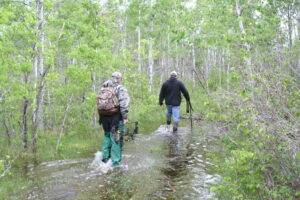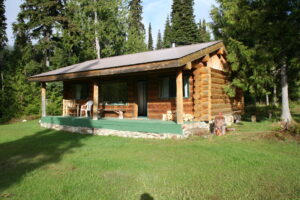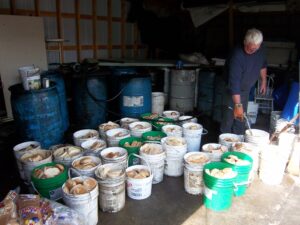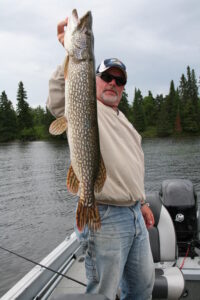A lot of things can go into the decision on choosing the right bear hunt. Here’s some sound advice.
By Bernie Barringer
I couldn’t help but fidget. I was sitting only eight feet from the ground in some rusty steel contraption that resembled a ladder with a large board tied across the top. The past four hours of seeing nothing but squirrels was taking a toll on me. I could stand on the board and lean against the tree or sit on the board and dangle my feet over the edge, which caused my legs to go numb. I was not happy that my outfitter had put me in this position. I had two hours to go.
Two nice bears came in the last half hour of daylight and immediately looked up at me. Two bears had been shot off this bait already in the past couple weeks, and the remaining bears were savvy to the stand’s location. Night number two was a repeat except I had brought a seat cushion which made the long vigil more bearable. Not only did the bears have the gig figured out but the wind was perfectly wrong for this stand. They worked hard at staying out of range.
The outfitter was limited in the number of stands he had available. High water had flooded the majority of his hunting area and in fact several baits were under water. He was in a tough spot, but his guide, the one taking me in and out of the baits, didn’t make things any better by being insensitive to me needs.

The following day I suggested we put a ladder stand up 30 yards away from the current location, which would put me in a great spot for the wind, and the two bears’ attention would be focused on the empty stand. I had seen a new ladder stand still in the box leaning in the corner of the shed. The guide ignored my request.
In this case, the outfitter was struggling due to the weather and I knew that going in. He is a very reputable outfitter and has a great reputation, but his part-time guide was a tough case. The hunt was made much more difficult because the guide was a substitute called in at the last minute and had a “my way or the highway” attitude. I tried to gently suggest things, even pitched the ideas so he could take the credit for them and even tried to make it look like he thought of them himself. Nothing doing.
There are good reasons for doing due diligence before you book a hunt. Guides like this one are one of the reasons you call references before you plunk down your hard-earned deposit. For every bad experience I have had a dozen good ones. But the bad ones do tend to stick in your mind. Let’s take a look at the key points in choosing the right outfitter and minimizing the chances of having a regretful trip.
What kind of a hunt do you want?
The first question you need to ask yourself is what type of a hunt you want. There are hound hunts, spot & stalk hunts, baited hunts and even combinations of these. Think about your physical capabilities, your shooting ability, experience and desires. Scenery, number of bears you want to see, frantic action or lack of it, and climate. These things and more go into your choice of a hunt. If you start talking to an outfitter and you realize this isn’t exactly what you are looking for, don’t hesitate to back out.

Sports shows are one of the best places to learn more about a hunt. You can often meet the outfitter and sometimes a guide in person. You can look at an album of photos and have a candid discussion that will give you a real gut feeling for the hunt and the people you will entrust with your money and in some cases your life. In the course of the discussion you will think of questions to ask so ask them on the spot. On the drive home, you will think of even more questions to ask so write them down.
If you do not meet the outfitter in person then plan to have a good phone conversation and ask the tough questions. Get references of successful and unsuccessful past clients and call them. If they sound like they have a canned response, they are may be getting a lot of calls because the outfitter knows his reference will tell you what you want to hear.
Define your Expectations
Realistically, an outfitter can’t offer you the hunt you really want unless they know exactly what you want. Many people have had a bad experience because they went on a hunt that wasn’t a good fit because they didn’t specifically tell the outfitter what they wanted. If an outfitter says they have fishing available, but you get there and find out its only fly fishing and you don’t know how to fly fish; that’s your fault, you should have clarified it before you left home.
Be honest about your physical limitations. Don’t go on a spot & stalk hunt in the mountains if you can’t hike up a dozen mountains a day. Likewise, if you are 400 pounds and can’t get into a treestand, it would be a good idea to tell the outfitter that ahead of time so he can get a ground blind in place. Don’t surprise your outfitter when you pull into camp. He will be asking questions and expecting honest answers and you should be too.

Are you looking for a truly big black bear? Make sure you are going to a place that has them. There are a lot of places that specialize in getting everyone a bear, but the top end of them is about 300 pounds. If you want to bag a giant, you have to ask the questions that will help you understand the type of operation you are dealing with. Looking for a color phase bear? Ask the specific questions about percentages of color bears. Then ask exactly how many and what colors were bagged there in the past three years. Trust your gut, if it doesn’t feel right, back off.
Make your needs and preferences known. If you have health issues as simple as a lactose intolerance or an allergy, tell them so they can pass it along to the cook. If the sight of a baloney sandwich makes you want to barf, tell them that. Or don’t complain if you find yourself in a treestand for six hours with nothing but a baloney sandwich to eat.
Ask specific questions about the temperatures, clothing you should bring and footwear. Not much is worse than having nothing but leather hunting boots when you have to slog through a swamp to get to your stand. Wet, smelly feet can ruin a trip as fast as anything. Ask about outerwear, mosquito protection, long johns and headwear.

Many baited hunts mean long hours in the stand during the afternoon and evening, but having something to do during the mornings can make a hunt much more enjoyable. Fishing is one option, sightseeing is another. Would they mind if you tagged along to check some baits? Ask ahead of time. One of my favorite hunts offered bowfishing for carp during the day.
What if you shoot your bear early in the hunt? Learn what might be available to take up your time while you wait for a buddy to get his bear, or wait for a scheduled return flight.
I like to get to know the area well before leaving for the hunt. I look at the area on Google Earth, check the weather for the hunt on a weather app, spend some time on the outfitter’s website and even Google the outfitter and see if I can come up with some information on a forum, either positive or negative.
I have been on many hunts and almost all of them have been a positive experience. By now you have noticed that a common theme in this article seems to be communication. That’s because the vast majority of bad experiences can be traced back to bad communication; either yours, the outfitter’s, or a substitute guide’s. Make sure it isn’t yours.
